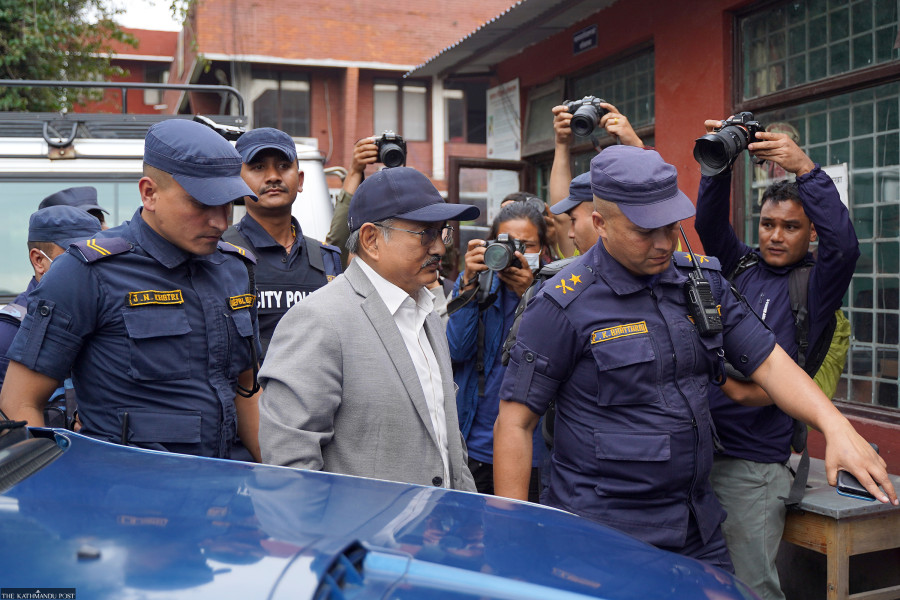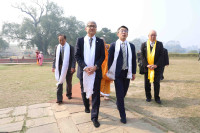National
Ill intention evident right from task force formation on Bhutanese refugees, watchers say
Government authorities had gone ahead with their plan despite the UNHCR’s clarification that third-country resettlement of the refugees left behind would not happen.
Prithvi Man Shrestha
A malafide intention is visible from the very beginning of the formation of a task force meant to manage Bhutanese refugees who were left behind after the third country resettlement programme ended, say officials and experts.
The United Nations High Commissioner for Refugees had closed the chapter on resettling the Bhutanese refugees in a third country in December 2016 after most of the Bhutanese refugees left for western countries.
“We cannot assume that the state was unaware of the impossibility of a third country resettlement of the Bhutanese refugees left behind in Nepal,” said Achyut Neupane, chief of the Kathmandu District Attorney’s Office, which filed the criminal cases against 30 individuals, including former deputy prime minister Top Bahadur Rayamajhi and former home minister Bal Krishna Khand, on May 24. “A malafide intention of some of the state actors who colluded with the racketeers is clearly visible here.”
In 2016, the UNHCR had announced cessation of the programme, which started in 2007, after resettlement of 113,500 Bhutanese refugees in eight Western countries. Of them, the United States alone received more than 90,000.
In 2019, the then government led by KP Sharma Oli had formed a task force under then-Home joint-secretary Bal Krishna Panthi to recommend ways to manage the Bhutanese refugees who remained in Nepal after the third-country resettlement programme ended. The taskforce submitted the report by including 429 Bhutanese refugees who had been left behind. Later, the racketeers, in collusion with some top officials, prepared another report and added hundreds of other people to the list of Bhutanese refugees.
But long before this task force was formed, collection of money from Nepalis aspiring to migrate as Bhutanese refugees appears to have begun.
Sanu Bhandari, one of the defendants in the case filed by the prosecutor in Bhutanese refugee scam, has claimed in his statement that he himself was a victim of false promises made by former deputy prime minister Top Bahadur Rayamajhi and his son Sandeep.
He claimed that he had given more than Rs6.96 million to Rayamajhis—both father and son—during the period between April 17, 2017 and April 13, 2018 in several instalments as they promised him and his family members that they would be sent to the US as Bhutanese refugees.
Right after the formation of a task force headed by Panthi, Bhandari had started collecting money from people who were interested in going to the US in the guise of Bhutanese refugees, according to the chargesheet. It said that Bhandari had made efforts to influence the task force members by taking them to various places on trips and spending money on them.
Questions were raised about the verified list of the Bhutanese refugees prepared by the Pathi-led taskforce. Some of the senior officials of the home ministry had even made efforts that the report prepared by the task force headed by Panthi should not be implemented, questioning the integrity of the report, according to the chargesheet.
Phanindramani Pokharel, joint-secretary at the Home Ministry, said in his statement that during the investigation, he had heard rumours of a conspiracy to take Nepalis to the US as Bhutanese refugees and he had also received information from the informal sources that even those verified 429 Bhutanese refugees required re-verification.
Then, some of the home ministry officials including Pokharel had hinted to the then home secretary Tek Narayan Pandey that a new task force should be formed to re-verify the 429 refugees as a tactic to delay the implementation of the Panthi-led report.
Pandey is among the high profile defendants in the case filed by the District Attorney Office, Kathmandu on the scam.
Then another task force was formed through a secretary-level decision on September 30, 2021 under the leadership of Chomendra Neupane, assistant chief district officer of Jhapa, to verify the list attached to the Panthi-led report.
As the new taskforce did nothing for months, the term of the panel was extended by two months through a ministerial-level decision on June 10, 2022, with a mandate to add the names of the refugees left behind.
After rumours spread about the conspiracy to send Nepalis in the guise of Bhutanese, the UNHCR had even issued a public notice, warning not to be duped by elements promising Bhutanese refugees that they would be sent to a third country for resettlement, according to Neupane.
In an undated letter attached with the chargesheet, the UNHCR said that the resettlement of the Bhutanese refugees had continued for a decade until 2016. “The resettlement programme concluded in 2016 and it will not resume,” the UNHCR letter, which appears to be a notice, stated.
As per the letter, the UN body has also clarified that Bhutanese refugees who are living in Nepal and are not in the resettlement process should not expect that they will be resettled in a third country through the UNHCR.
“The people inside the [Bhutanese refugee] settlements or outside can argue otherwise. They have either received wrong information or are spreading rumours,” the UNHCR said.
After Nepal’s efforts to repatriate the refugees to their home country failed, Nepal and the international community, including the UN refugee agency, had explored a third-country resettlement option.
Of around 120,000 refugees staying in camps in eastern Nepal since the 1990s, as many as 113,500 were resettled in various Western countries during the decade-long process. Around 8,500 Bhutanese refugees were estimated to have remained in the camps after the closure of the third-country resettlement process in 2016.
Police said the UNHCR, during the investigation, had notified them that they had informed the refugees about the closure of the resettlement chapter.
“In response to our queries, the UNHCR had written a letter to us saying that it had earlier issued a public notice that the chapter of a third country resettlement of Bhutanese refugees was over,” Kathmandu Police Range Chief Senior Superintendent of Police Dan Bahadur Karki told the Post.
According to former deputy inspector general of police Hemanta Malla, malafide intention was clearly visible from the very beginning when the task force headed by Panthi was formed and subsequent task forces were constituted. “I can’t say whether Panthi was aware of any malafide intention behind the formation of the task force,” Malla said. “But repeated formation of such panels and forgery of the main report submitted by the Panthi-headed team indicated bad intention.”




 17.12°C Kathmandu
17.12°C Kathmandu















